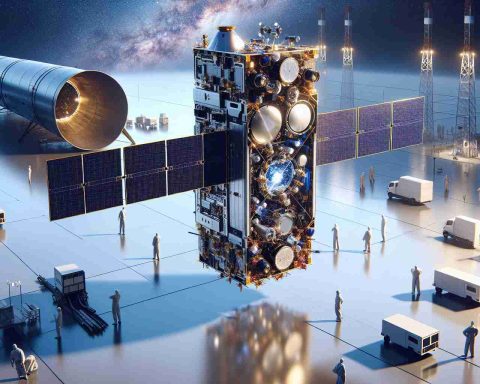Sweden’s New Era in Satellite Launching
The Swedish Space Corporation (SSC) is set to embark on an ambitious new venture, thanks to a recent contract from the Swedish Defence Materiel Administration (FMV). This pivotal agreement aims to establish foundational capabilities for satellite launches at the Esrange Space Center.
CEO Charlotta Sund emphasized the significance of this venture, noting it as a crucial step towards positioning Sweden as a leader in satellite technology within Europe. The implications extend beyond national borders, promising to strengthen ties with NATO and enhance overall European security.
In a strategic move on October 4, 2024, the Swedish government announced an impressive investment of approximately one billion SEK to develop the nation’s space capabilities through 2032. This funding will not only bolster the Armed Forces’ space situational awareness but will also modernize facilities at Esrange, allowing for the launching of multiple satellites.
The initial phase of this project involves a collaborative effort between FMV and SSC, focusing on the establishment of a basic launching capability. This initiative aims to ensure that Sweden maintains increased control and accessibility within the space domain.
Ultimately, this project is set to enhance the operational effectiveness of the Armed Forces, providing them with improved satellite capabilities and a stronger presence in space.
Sweden’s Bold Move: Pioneering Satellite Launch Capabilities
The Future of Sweden’s Space Ambitions
Sweden is on the brink of a significant transformation in its space capabilities, with the recent announcement of a substantial investment aimed at enhancing its satellite launch infrastructure. The Swedish Space Corporation (SSC) has partnered with the Swedish Defence Materiel Administration (FMV) to establish launch capabilities at the esteemed Esrange Space Center, marking a new chapter in the nation’s space exploration ambitions.
Investment and Strategic Importance
On October 4, 2024, the Swedish government committed approximately one billion SEK to develop the nation’s space technology until 2032. This vital funding is designed not only to upgrade the Armed Forces’ space situational awareness but also to modernize facilities at Esrange, enabling the launch of multiple satellites. The investment reflects Sweden’s intention to play a pivotal role in European aerospace and defense, enhancing collaboration with NATO partners and boosting regional security.
Key Features of the Initiative
– Enhanced Launch Capabilities: The program aims to establish basic and advanced satellite launch capabilities, thereby increasing Sweden’s self-reliance in accessing space.
– Collaboration with NATO: Strengthening ties with NATO enhances security and provides opportunities for joint missions and data sharing.
– Economic Growth: The investment is expected to stimulate local economies and create new job opportunities in the burgeoning space sector.
Use Cases and Operational Benefits
The satellite capabilities derived from this project will serve multiple functions:
– Military Applications: Improved observation and communication capabilities for the Armed Forces.
– Scientific Research: Facilitation of scientific missions that require data collection from space.
– Commercial Ventures: Potential for private sector innovation and partnerships in satellite technology and launch services.
Challenges and Limitations
While the initiative is ambitious, it does face certain challenges:
– Environmental Concerns: Launching satellites may have implications for local ecosystems, requiring careful planning and sustainable practices.
– Technological Development: Developing reliable and cost-effective launch vehicles and technologies will be essential.
– Funding Risks: Ensuring continued funding and support from the government and private sectors will be critical for the project’s success.
Comparative Analysis
In the European context, Sweden’s efforts to build its satellite launching capabilities can be compared to initiatives in countries like France, Germany, and Italy, which have well-established space programs and facilities. While Sweden is starting to carve its niche, these nations offer robust infrastructure and experience in satellite technology.
Conclusion and Future Predictions
As Sweden embarks on this innovative journey, the implications extend well beyond military enhancement. The project signifies the country’s desire to position itself as a key player in the global space race, focusing on security, scientific discovery, and economic development. With the right strategies and continued investment, Sweden could become a leading hub for satellite launches in Europe by 2032.
For more insights into Sweden’s space initiatives and their impact, visit the Swedish Space Corporation website.




















